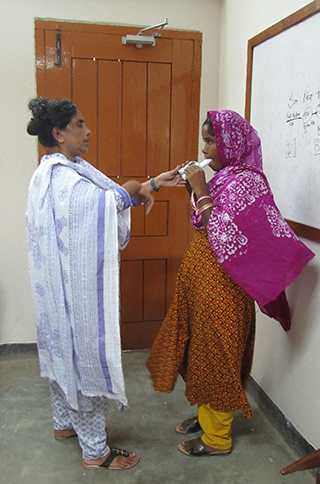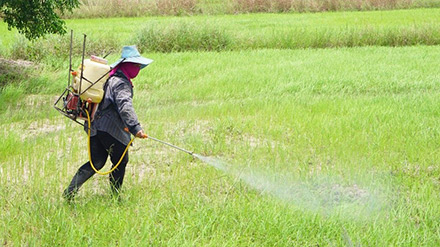By Julie Leibach

Seven international collaborations have received awards from the Global Environmental and Occupational Health (GEOHealth) program, led by the Fogarty International Center (FIC), in partnership with NIEHS, the National Cancer Institute, the National Institute on Aging, and the Office of Research on Women's Health. The GEOHealth program supports the development of regional centers, or hubs, that foster research and training to alleviate pressing environmental and occupational health problems in low- and middle-income countries.
Unhealthy living and working conditions are responsible for nearly a quarter of global deaths, most of which occur in low- and middle-income countries, according to the World Health Organization .
"Many of those countries lack resources to study the health effects of local environmental and occupational hazards, such as air pollution or pesticide exposure," said Christine Jessup, Ph.D., GEOHealth program officer for FIC. "The goal of the program is to build and support research collaborations in low-resource nations so that they can produce locally relevant scientific evidence needed to inform policies and to improve health."
At the heart of each hub is a border-spanning partnership: An academic institution in a low- or middle-income country oversees research projects, and a U.S.-based university coordinates related research training.
"Training can occur at either location," explained Mike Humble, Ph.D., GEOHealth program officer for NIEHS. "The program aims to equip young scientists with the skills needed to perform research related to the public health needs in their region. We hope the training and research will lead to sustainable efforts and impact beyond the award period."
New and Returning Hubs
Hubs receive funding for five years. Several of the following hubs involve regional collaborations with other countries:
- Bangladesh (renewal)
Building on earlier work, researchers will examine the long-term health effects of air pollution reduction in homes that have transitioned from stoves that burn biomass, like wood, to stoves that use cleaner fuels. The team will also investigate whether a mobile phone-based educational intervention can encourage people to switch to liquid petroleum gas. In addition, they plan to explore the health effects of exposure to industrial waste, among other environmental and hazards, facing garment workers. - East Africa (renewal)
Investigators are studying the consequences of air pollution exposure in women and children in Ethiopia, Kenya, and Uganda, with a focus on respiratory and reproductive health, blood pressure, and brain function. The hub will also look at how occupational heat stress affects worker productivity and kidney health. - India (renewal)
Researchers are considering how factors such as socioeconomic status, gender, and illness influence the effects of exposure to several air pollutants and temperature extremes across different life stages. They will incorporate data from multiple locations across the country. - Jordan
The Jordan-based hub will work regionally on several projects focused on climate change and health. One project will examine the impacts of heat waves, water scarcity, and nitrate pollution in Jordan. Another will study the health effects of air pollution on respiratory, cardiovascular, and skin diseases among women and children in Lebanon. A third will look at relationships between seasonal weather patterns and levels of desert dust pollution in Morocco. - Lebanon
In collaboration with institutions in Egypt and Sudan, the Lebanon-based hub will focus on agricultural health. One study will evaluate the pathways of pesticide exposure among Syrian refugee agricultural workers. Researchers will also assess links between pesticide exposures and neurobehavioral outcomes and how social factors influence those associations. - Mongolia
Investigators will look at relationships between exposure to particulate matter, a type of air pollutant, and respiratory viral infections. In addition, two pilot studies will analyze the effects of particulate matter on tuberculosis in the lungs and on bone density. - Peru (renewal)
Through a variety of studies, teams are exploring the health effects of air pollution. For example, they will examine associations between COVID-19, pneumonia, and air pollution exposure. They are also planning the first study in Lima on connections between Alzheimer's disease and air pollution. In addition, researchers aim to create a national model for particulate matter and potential mitigation strategies.
Seeing Results

The GEOHealth program launched in 2012, evolving from an earlier initiative pioneered by FIC, NIEHS, and the National Institute for Occupational Safety and Health. Planning grants funded hubs for two years for the purposes of building collaborations and identifying priority needs.
In 2015, seven hubs received the first round of five-year grants. At least 168 research trainees have been involved with the program, based on recent progress reports, and teams have published over 145 papers, according to Jessup.
Hubs have also offered various educational opportunities to public health professionals from academia, government agencies, and nonprofit organizations and fostered the development of new graduate programs in low- and middle-income countries.
GEOHealth researchers have even influenced policy.
"One of the most rewarding aspects of our GEOHealth work has been the impact on the debate in Thailand over banning harmful pesticides," wrote members of the Southeast Asia GEOHealth Hub, which studied certain health effects of pesticide exposure, in 2020.
That same year, Thailand officially banned two widely used pesticides called paraquat and chlorpyrifos, as an earlier edition of this newsletter reported.
Keeping the Ball Rolling
GEOHealth projects have also inspired offshoots. For example, East Africa hub principal investigator Kiros Berhane, Ph.D., of Columbia University, recently received a grant from the NIH Common Fund's DS-I Africa program . The award supports data science training and technology development geared toward improving health among African communities.
Berhane's group plans to build capacity for public health data science training at African academic institutions through course development and faculty mentoring. Areas of study include environmental health, occupational exposures, and climate change, among others.
"It's exciting to see that project move forward," Jessup said. "There is a huge need to collect, synthesize, and efficiently process epidemiological data on a local and regional level to address environmental health challenges."
One hallmark of the GEOHealth program is its built-in scientific network, according to Jessup.
"For example, trainees from the Caribbean and Peruvian hubs developed a collaborative research project focused on arsenic exposure," she said. "Meanwhile, trainees from the Bangladesh, Ghana, and India hubs cross-trained in a modeling workshop focused on air pollution, climate, and health organized by the India hub."
The program also hosts annual networking meetings where hub members present and discuss findings. Those meetings highlight a collegial spirit crucial to teamwork, Humble noted.
"At past network meetings, trainees had opportunities to present their research. Their mentors and colleagues took pictures of them, capturing that proud moment of their first presentation at the NIH," he recalled. "Trainees are also good about talking to each other during the network meetings. Those simple types of interactions really help build the global health network that we envisioned."


